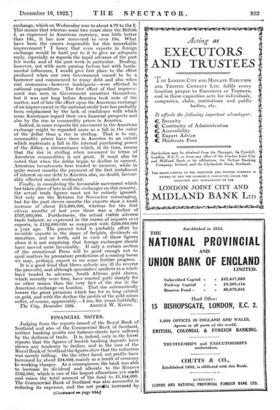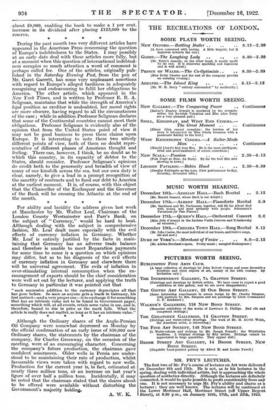FINANCIAL NOTES.
Judging from the reports issued of the Royal Bank of Scotland and also of the Commercial Bank of Scotland, neither banking profits nor balance-sheets have suffered by the dullness of trade. It is, indeed, only in the latest reports that the figures of Scotch banking deposits have shown any tendency to decline, and in the case of the Royal Bank of Scotland the figures show that the reduction was merely trifling. On the other hand, net profits have increased by about £24,000, mainly as a result of economy in working charges. As a consequence, the bank was able to increase its dividend and allocate to the Reserve £162,000, which is one of the largest allocations yet made and raises the total amount of the fund to 11,104,000. The Commercial Bank of Scotland was also successful in reducing its expenses, and the net profits increased by (Continued sit page 9844 -about £43,000, enabling the bank to make a 1 per cent. increase in its dividend after placing 1125,000 to the reserve.
During the past month two very different articles have appeared in the American Press concerning the question of Europe's indebtedness to the States. I may possibly at an early date deal with these articles more fully, but at a moment when this question of international indebted- ness occupies so much attention a word of comment is perhaps called for. One of the articles, originally pub- lished in the Saturday Evening Post, from the pen of Mr. Garet Garrett, has some very unpleasant assertions with regard to Europe's alleged tardiness in adequately recognizing and endeavouring to fulfil her obligations to America. The other article, which appeared in the New York Times, and is written by Professor E. R. A. Seligman, maintains that while the strength of America's legal position as creditor is undoubted, her moral rights are more obscure, having regard to all the circumstances of the case ; while in addition Professor Seligman declares that some of the Continental countries cannot meet their obligations. Professor Seliginan is evidently also of the opinion that from the United States point of view it may not be good business to press these claims upon Europe. It is interesting to note these two utterly different points of view, both of them no doubt repre- sentative of different phases of American thought and feeling. There can, however, I think, be no doubt as to which this country, in its capacity of debtor to the States, should consider. Professor Seligman's opinions do credit both to the generosity and breadth of view of many of our kinsfolk across the sea, but our own duty is clear, namely, to give a lead in a prompt recognition of the sanctity of contracts and to fund our debt to America at the earliest moment. It is, of course, with this object that the Chancellor of the Exchequer and the Governor of the Bank will be crossing the Atlantic at the end of the month.
For ability and lucidity the address given last week at Manchester by Mr. Walter Leaf, Chairman of the London County Westminster and Parr's Bank, on the subject of "Currency," would be hard to beat. Although dealing with the subject in comprehensive fashion, Mr. Leaf dealt more especially with the evil effects of currency inflation in Germany. Whether Mr. Leaf is entirely justified by the facts in main- taining that Germany has an adverse trade balance and therefore is unable to meet Reparation payments for some time to come is a question on which opinions may differ, but as to his diagnosis of the evil effects of currency inflation in Germany and elsewhere there will be universal agreement. The evils of inflation in over-stimulating internal consumption when the en- couragement of exports should be the chief consideration were well set out by the lecturer, and applying the truth to Germany in particular it was pointed out that "each successive addition to the currency depreciates all that has gone before. So soon as anyone gets -a mark in Germany, his first instinct—and a very proper one—is to exchange it for something that has an intrinsic value not to be found in Government parr' something which vrill, at all events, retain some value in use an is, therefore, bound to rise in price as the mark falls. What the article is really does not matter, so long as it has an intrinsic value."
Although the Ordinary shares of the Anglo-Persian Oil Company were somewhat depressed on Monday by the official confirmation of an early issue of 850,000 new Ordinary shares, the statements by the chairman of the company, Sir Charles Greenway, on the occasion of the meeting, were of an encouraging character. Concerning the company's future production, the chairnian gave confident assurances. Older wells in Persia are under- stood to be maintaining their rate of production, whilst favourable views were taken with regard to new wells. Production for the current year is, in fact, estimated at • nearly three million tons, or an increase on last year's figure of over half a million tons. Incidentally, it may be noted that the chairman stated that the shares about to be offered were available without disturbing the Government's majority holding. A. W. K.















































 Previous page
Previous page